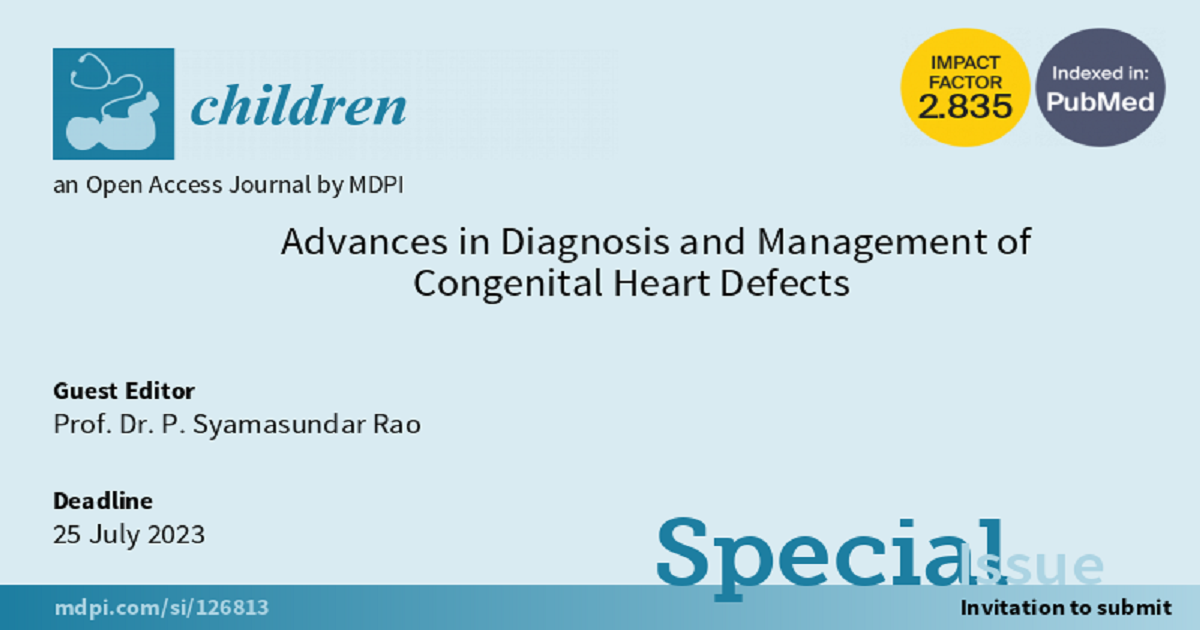Advances in Diagnosis and Management of Congenital Heart Defects
A special issue of Children (ISSN 2227-9067). This special issue belongs to the section "Pediatric Cardiology".
Deadline for manuscript submissions: closed (5 March 2024) | Viewed by 2143

Special Issue Editor
Interests: congenital heart disease; pediatric cardiology; tricuspid atresia; physiologically advantageous ventricular septal defect; interventional pediatric cardiology; neonatal cardioloy; echocardiography
Special Issues, Collections and Topics in MDPI journals
Special Issue Information
Dear Colleagues,
During the last five decades, a number of advances in the diagnosis and management of congenital heart defects (CHDs) have occurred: detection of CHD by fetal ultrasound; early identification of newborn babies with critical heart disease through conventional methods as well as by pulse oximetry screening; rapid transportation of identified babies to tertiary care facilities; accessibility to exceedingly sensitive non-invasive diagnostic methods, namely, echocardiography along with Doppler technology, magnetic resonance imaging (MRI), and computed tomography (CT); developments in percutaneous, catheter-based therapy; advances in anesthesia for CHD patients; application of intricate surgical techniques to address complex CHDs; and remarkable advances in post-operative care lead to positive results so that a large proportion of babies born with CHD are surviving and reaching adulthood.
A Special Issue on “Advances in Diagnosis and Management of Congenital Heart Defects” is being organized by the journal Children to discuss these advances. We invite investigators to contribute original research articles as well as review articles that will stimulate the continuing efforts to improve our understanding in this challenging field.
Prof. Dr. P. Syamasundar Rao
Guest Editor
Manuscript Submission Information
Manuscripts should be submitted online at www.mdpi.com by registering and logging in to this website. Once you are registered, click here to go to the submission form. Manuscripts can be submitted until the deadline. All submissions that pass pre-check are peer-reviewed. Accepted papers will be published continuously in the journal (as soon as accepted) and will be listed together on the special issue website. Research articles, review articles as well as short communications are invited. For planned papers, a title and short abstract (about 100 words) can be sent to the Editorial Office for announcement on this website.
Submitted manuscripts should not have been published previously, nor be under consideration for publication elsewhere (except conference proceedings papers). All manuscripts are thoroughly refereed through a single-blind peer-review process. A guide for authors and other relevant information for submission of manuscripts is available on the Instructions for Authors page. Children is an international peer-reviewed open access monthly journal published by MDPI.
Please visit the Instructions for Authors page before submitting a manuscript. The Article Processing Charge (APC) for publication in this open access journal is 2400 CHF (Swiss Francs). Submitted papers should be well formatted and use good English. Authors may use MDPI's English editing service prior to publication or during author revisions.
Keywords
- congenital heart defects
- pediatric cardiology
- recent advances
- echocadiography
- magnetic resonance imaging
- computed tomography
- pediatric cardiac surgery
- transcatheter interventional procedures






